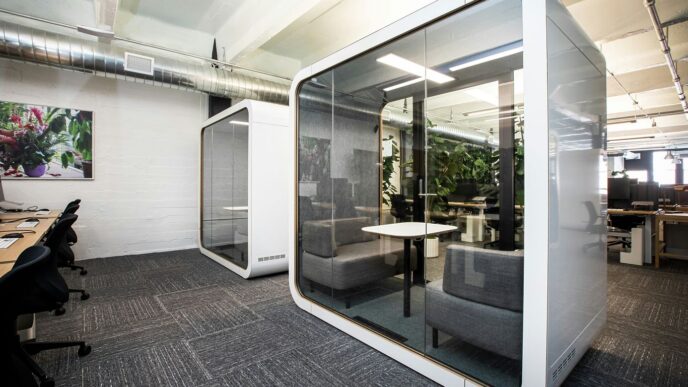The world of work is changing fast, and trying to keep up can feel like a full-time job itself. What was true about finding work even a year ago might not apply today. As we move through 2025, things are really different. Companies are looking for new skills, and how and where we work is shifting. Let’s get into what’s happening in the job market right now and what you can do to find your next opportunity.
Key Takeaways
- The job market in 2025 is cooling down, meaning companies are hiring more slowly and taking longer to fill roles, especially in tech and finance.
- Remote and hybrid work are here to stay, but flexibility often depends on your experience and the industry you’re in.
- AI is changing jobs, but it’s often seen as a tool to help workers do their jobs better, not just replace them. Learning AI skills is becoming important.
- Companies are focusing more on what you can *do* (skills) rather than just where you went to school (degrees). Soft skills like communication are also a big deal.
- Networking and showing how you can solve a company’s problems are more important than ever for standing out in your job search.
Understanding the Current Job Market Right Now

The Accelerating Pace of Change in 2025
The job market in 2025 feels like it’s on fast-forward. Things that used to take years to shift are now happening in months. It’s not just about new tech popping up; it’s how quickly businesses are adopting it and changing how they operate. Think about it – a few years ago, remote work was a niche thing, and now it’s a standard option for many. This rapid evolution means what you knew yesterday might not be enough for tomorrow.
Key Trends Shaping Today’s Workplace
Several big things are changing how we work right now. For starters, the hiring frenzy we saw a couple of years back has definitely cooled down. Companies are being more careful about who they bring on board, and it’s taking longer to fill positions. This means the power has shifted a bit back to employers.
Here are some of the major shifts:
- AI Integration: Artificial intelligence isn’t just a buzzword anymore. It’s actively being used in how companies find and screen candidates. This can speed things up, but it also means your application needs to be sharp.
- Skills Over Degrees: More and more, employers are looking at what you can do rather than just the piece of paper you got from college. If you’ve got the skills, even without a traditional degree, you’ve got a good shot.
- Work Arrangement Flexibility: Remote and hybrid work are here to stay. Companies are figuring out how to make these models work long-term, balancing in-office time with the benefits of working from home.
- The Gig Economy: More people are choosing freelance or contract work. It offers freedom, but it also comes with its own set of challenges regarding stability and benefits.
Navigating a Cooling Hiring Climate
So, the job market has definitely cooled off. It’s not the wide-open door it was recently. Job postings are down from their peak, and companies are taking their sweet time filling roles. This is especially noticeable in fields like tech and finance, where competition is pretty fierce right now.
What’s causing this slowdown?
- Economic Factors: Inflation is still a concern, and interest rates are high, which makes companies hesitant to spend big on expansion.
- Policy Changes: Shifts in immigration rules have created gaps in certain industries that relied on international workers, like hospitality and tech.
For anyone looking for a job, this means you need to be smart about it. Networking is more important than ever, and you really need to focus on developing the specific skills that companies are looking for. It’s less about sending out tons of applications and more about targeting the right opportunities and showing exactly what you bring to the table.
The Evolving Landscape of Work Arrangements
Remote and Hybrid Work: A Permanent Fixture
Remember when working from home felt like a temporary fix? Well, those days are pretty much over. Most companies have figured out that letting people work remotely or mix it up with some office days is actually a good thing. It turns out, forcing everyone back into the office full-time wasn’t the magic bullet some leaders thought it was. We saw people leaving, productivity dipping, and just general unhappiness. So, now, it’s less about going back to how things were and more about finding a balance that works for everyone. Companies are getting smarter about offering arrangements that fit both the business needs and what employees actually want. This means more flexibility, and for job seekers, it opens up opportunities beyond your local area. The catch? Competition is tougher because you’re up against people from all over.
- Highlight your remote work skills: Make sure your resume and LinkedIn clearly show you can manage your time, communicate well online, and work independently.
- Be ready for global competition: Understand that remote roles attract candidates worldwide.
- Focus on results: Employers want to see you can deliver, no matter where you log in from.
The Growing Gig and Freelance Economy
The idea of staying at one company for your whole career is becoming less common. More and more people are jumping into freelance and gig work. There are tons of platforms out there now that connect people with projects, making it easier than ever to find work. For many, this means more freedom to pick projects, set their own hours, and even earn more. It’s a great way to build up experience in different areas or just have more control over your schedule. Think writing, design, coding, or consulting – the options are pretty wide open.
- Build a strong online presence: Your portfolio and testimonials are your best advertising.
- Network actively: Connect with potential clients and other freelancers.
- Be reliable: Delivering quality work on time is how you get repeat business and good reviews.
Contractors: Freedom or False Security?
Companies are increasingly bringing in contractors for specific tasks instead of hiring full-time staff. This trend is huge globally, with the gig economy bringing in serious money. Why? It gives companies flexibility and helps them fill skill gaps quickly, especially in tech and marketing. For workers, it can mean higher pay, more project choice, and the ability to work remotely. It sounds great, right? But it’s not always sunshine and rainbows. Contractors often have to handle their own taxes and benefits, and the income can be unpredictable. Plus, there’s less job security compared to a permanent role. It’s a trade-off between freedom and stability that’s worth thinking about carefully.
AI’s Impact on the Job Market Right Now
It feels like everywhere you turn, there’s talk about Artificial Intelligence and how it’s changing jobs. Some people are worried AI will take over, and honestly, that’s a valid concern. We’ve seen headlines predicting massive job losses, especially in fields like tech and finance. It’s true that AI is changing how companies hire and what skills they’re looking for. A lot of us might feel like we’re just data points in a system now, dealing with automated responses instead of actual people. It’s a big shift, and it’s happening fast.
AI Integration in Hiring Processes
Companies are definitely using AI more and more to sift through applications. Think about it: instead of a human reading every single resume, an AI can scan thousands in minutes. This can speed things up, but it also means your application needs to be optimized for these systems. It’s not just about listing your experience; it’s about using the right keywords and making sure your accomplishments are clear and quantifiable. This is where understanding how AI works in hiring can give you an edge. It’s not about beating the system, but working with it.
AI as an Upgrade, Not Just a Threat
While the fear of job displacement is real, many experts see AI more as a tool that can make our jobs better, not just replace them. Instead of thinking AI is coming for your job, consider how it can help you do your job more effectively. For example, AI can handle repetitive tasks, freeing you up for more complex problem-solving or creative work. The professionals who will do best in 2025 are those who learn to work alongside AI, using it to boost their own capabilities. It’s about augmenting human skills, not eliminating them. This means focusing on the things AI can’t easily replicate, like critical thinking, creativity, and emotional intelligence.
Prioritizing AI Upskilling for Future Roles
Given how quickly AI is evolving, it’s becoming super important to keep your skills up to date. This isn’t just for tech jobs anymore. People in marketing, finance, HR, and pretty much every other field are finding that some level of AI knowledge is becoming necessary. You don’t necessarily need a degree in computer science, but understanding basic AI concepts and how they apply to your work is a smart move. Many employers are looking for practical skills and demonstrated ability to use AI tools, rather than just formal qualifications. Getting familiar with AI can open up new opportunities and make you a more attractive candidate in this changing job market. You can start by looking into online courses or even just experimenting with AI tools relevant to your industry to build that practical experience.
Skills and Qualifications in Demand
Forget just listing your old job titles. Today’s employers are looking at what you can do, not just where you’ve worked. This shift is a big deal, especially in fields like tech, marketing, and design where skills are easier to measure. It means you need to show off your abilities, not just your history.
Skills-First Hiring: Beyond Traditional Degrees
It’s true, that four-year degree still matters for some jobs, but it’s not the only ticket in anymore. Many companies, even big tech names, are realizing that great talent can come from anywhere. They’re starting to look past the diploma and focus on what skills you’ve actually picked up, whether that was through online courses, bootcamps, or just teaching yourself. This is good news if you’ve developed skills in areas like data science, coding, or digital marketing but don’t have a traditional background. Employers are finding that this approach helps them find good people they might have otherwise missed.
The Importance of Soft Skills
Sure, you need to know how to do the job, but how you do it matters just as much. Think about things like communicating well, working with others, solving problems, and adapting when things change. These are the soft skills that help teams actually get things done and make a workplace run smoothly. Companies are looking for people who can not only perform tasks but also fit in and contribute positively to the team environment. Being able to show you’re a good communicator and a team player can really make your application stand out.
Demonstrating Value Through Practical Experience
So, how do you show employers you’ve got the skills they need? It’s all about proving it. Instead of just saying you’re good at something, show them. Did you work on a project that saved the company money? Quantify it. Did you improve a process? Explain how. Highlighting specific achievements with numbers and clear results is way more convincing than a general statement about your responsibilities. Think about your resume and interview answers as chances to tell a story about the value you bring. What problems can you solve for them? What results can you deliver? Focus on that.
Strategic Approaches for Job Seekers
Okay, so the job market right now? It’s definitely not like it was a few years back. Things are a bit tighter, and companies are being more careful about who they bring on board. This means you really need to have a solid plan. It’s not just about sending out a bunch of resumes and hoping for the best anymore. You’ve got to be smart about it.
Crafting Standout Applications
First off, your resume and cover letter. Forget just listing your old jobs. You need to show them what you can do for them. Think about the specific job you’re applying for. What are their pain points? How can your skills solve their problems? Tailoring your application to each specific role is no longer optional; it’s the bare minimum. Use keywords from the job description – seriously, Applicant Tracking Systems (ATS) are a thing, and they scan for these. Tools exist that can help you match your resume to the job posting, which can be a real time-saver.
Here’s a quick checklist for your applications:
- Read the job description carefully: Highlight the key skills and responsibilities they mention.
- Customize your resume: Weave those keywords and skills into your experience descriptions.
- Write a targeted cover letter: Explain why you’re a good fit for this specific company and this specific role. Don’t just repeat your resume.
- Quantify your achievements: Instead of saying "managed projects," say "managed 5 projects simultaneously, completing them 10% under budget."
The Power of Networking and Personal Branding
Honestly, who you know can still open a lot of doors. In a market where companies are being more selective, referrals often get a closer look. It’s not just about having a LinkedIn profile; it’s about actively using it and other platforms to build connections. Think about people you know who work at companies you’re interested in. Reach out, ask for advice, and see if they can put in a good word. It sounds simple, but it really works. People are often happy to help someone they know, especially if their company offers a referral bonus.
Don’t forget about internal networking if you’re currently employed. Building relationships across different departments can alert you to opportunities before they’re even posted publicly. It’s about making yourself visible and showing your interest in growth within the company.
Leveraging Your Unique Value Proposition
So, what makes you different? What can you bring to the table that others can’t? This is your unique value proposition. It’s not just about your degree anymore, though that can help. Companies are increasingly looking at skills and practical experience. Have you worked on personal projects? Contributed to open-source software? Taken online courses to learn a new skill? These things show initiative and a willingness to learn, which are huge pluses. Think about your career story and how it highlights your strengths and what you’re passionate about. Clearly articulating this value is key to standing out. It’s about showing them not just what you’ve done, but what you can do for their future.
Diversity and Inclusion in the Modern Workplace

It feels like everywhere you look these days, companies are talking about diversity, equity, and inclusion, or DEI. And it’s not just talk anymore. Businesses are starting to really get that having a bunch of different people with different backgrounds and ideas actually makes them stronger. It leads to more creative solutions and smarter decisions. So, if you’re someone who cares about working in a place that values everyone, you’re in luck because there are more opportunities out there for you.
This isn’t just about checking boxes for race or gender, though that’s part of it. It’s also about things like neurodiversity, making sure people with disabilities have a fair shot, and opening doors for groups that haven’t always had them in certain fields. It’s a much broader view of what makes a team robust.
DEI Initiatives as a Hiring Driver
Companies are actively looking for candidates who not only fit the job but also contribute to a more inclusive environment. Many organizations now have specific DEI goals they’re trying to meet, and they see hiring people who champion these values as a way to get there. This means that if you can show you understand and support DEI principles, it can really make your application stand out. It’s becoming a key factor in how they build their teams, not just a nice-to-have.
Seeking Employers Committed to Inclusivity
When you’re looking for a new job, it’s worth checking out what a company’s actual practices are when it comes to DEI. Don’t just go by what they say on their website. Look for things like employee resource groups, transparent promotion processes, and public statements about their commitment. Some companies are really walking the walk, and finding one that aligns with your values can make a big difference in your job satisfaction. It’s about finding a place where you feel you can be yourself and do your best work.
Highlighting Your Commitment to DEI
So, how do you show a potential employer that you’re on board with DEI? It’s not about having a degree in the subject. It’s more about your actions and your perspective. Think about times you’ve worked on diverse teams, how you’ve contributed to making a group feel more welcoming, or any training you’ve done. Even in your cover letter or during an interview, you can mention why an inclusive environment is important to you and how you plan to contribute to it. It shows you’re thoughtful and that you’ll be a positive addition to their workplace culture.
Wrapping It Up
So, the job market right now? It’s definitely not what it was even a year ago. Things are shifting with remote work settling in, AI becoming a bigger deal, and companies looking for different skills. It can feel a bit overwhelming, but honestly, it’s also a chance to grow. Staying curious, learning new things, and just talking to people in your field can make a huge difference. Don’t get discouraged by the changes; instead, see them as a sign to keep moving forward and find what works for you.
Frequently Asked Questions
Is it harder to find a job right now?
Yes, the job market has slowed down a bit. Companies are taking longer to hire, and there are more people looking for jobs in some areas. It’s important to be patient and keep trying.
Are remote jobs still common?
Remote and hybrid jobs are still a big part of work, but they might be a little harder to get than before. Companies often prefer people with more experience for these roles. Flexibility can depend on your job and how much you can offer the company.
Should I worry about AI taking my job?
AI is changing jobs, but it’s more likely to help you do your job better or change how you do it, rather than taking it away completely. Learning about AI and how to use it can actually make you more valuable.
Are degrees still important for getting a job?
Many companies are now looking more at the skills you have and what you can do, rather than just your college degree. Showing that you have the right skills through projects or experience is becoming very important.
What are ‘soft skills’ and why do they matter?
Soft skills are things like how well you communicate, work with others, solve problems, and adapt to change. These skills help you work well in a team and are very important for success, even more so than just knowing how to do a specific task.
Is networking still important for finding a job?
Yes, networking is super important! Many jobs are found through people you know, not just by applying online. Talking to people in your field, letting them know you’re looking, and building connections can open up many doors.














